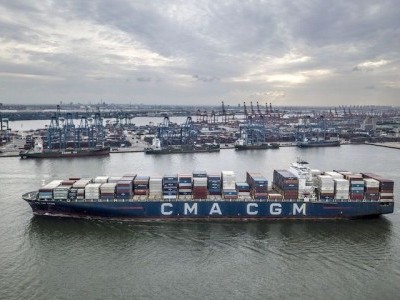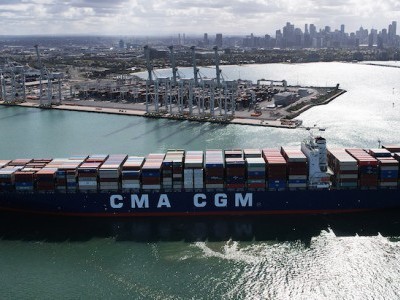Maersk’s Clerc calls on IMO to support reduced carbon emissions in shipping

Vincent Clerc, CEO of A.P. Moller- Maersk, urges the United Nations International Maritime Organization (IMO) to adopt measures that will incentivize ocean carriers to meet net zero carbon emissions for ships now.
On August 27th, Clerc spoke to reporters at the newly built containership Alette Maersk naming ceremony. The ceremony occurred at the Port of Los Angeles after the vessel sailed from China to Los Angeles on green methanol fuel.
IMO and Vessel GHG
According to a March IMO report, “The draft outline illustration of a possible IMO net-zero framework lists regulations under the International Convention for the Prevention of Pollution from Ships (MARPOL), which will be adopted or amended to allow for a new global fuel standard and a new global pricing mechanism for maritime GHG (Greenhouse gas) emissions. “
These may include:
- A goal-based “marine fuel standard regulating the phased reduction of the marine fuel’s GHG intensity; and
- an economic mechanism(s) to incentivize the transition to net-zero.”
The measures specified in the revised IMO “Strategy on the Reduction of GHG Emissions from Ships” will be discussed at the upcoming meeting beginning on September 30th, the report said.
Clerc supports these initiatives as Maersk had played a pioneering role in advancing the goals of reductions of Greenhouse gases through its construction of dual fuel ships that can run on green methanol which substantially reduces carbon emissions.
In response to a question from AJOT, Clerc said: “We have said ‘if you adopt this regulatory framework, we're done with decarbonizing this industry by 2050.’ I think it's unique …. where companies have voluntarily said, ‘if you give us this, we'll get it done.’ … I just think that the industry with the knowledge of the inner workings of economics incentives and technical feasibilities and ecosystem dynamics and so on, has been able to … chart a course. And it is beyond me. If that does not end up being that the countries go back to us and say, ‘Okay, game on: you got your framework, now get it done.’”
Per Container Assessment
Clerc wants an assessment per container on carriers shipping containers powered by fossil fuels to incentivize the carriers to build zero and near-zero emission-powered vessels: “So what we've said, what we've done is say: how do we create the right level playing field without creating inflation? …. And basically, if it costs a hundred dollars more to sail a container on green fuel and 1% of these containers sail green if you take a levy of just $1 on the other 99 [percent] and give that … as a cost incentive to the one that buys a hundred, you have” a fair incentive process.
Clerc emphasized that the industry-wide approach Maersk advocates through the IMO is essential: “And here you have a sector that has leaned in ahead of regulation, but at least now asking for regulatory help, because the difference in cost between, for doing the right thing is so big that as it is today, it is not economically viable without some level of leveling the playing field and making it easier for consumers and customers to do the right choice. And that's really what we're trying to, to get here, is to sensibilize people to the fact that this is not in the distant future. It's here already. We've made a significant investment. We've proven that from an engineering perspective. We can decarbonize, we can put this whole segment and the whole global supply chain on a sustainable footing. But the market being what it is and the economics being what they are to do that without some type of incentives, without some type of carbon practices, it's going to be very difficult for consumers and customers alike to make the right choice…”
Clerc said he was very proud of the achievement of the Alette Maersk sailing from China to Los Angeles on green methanol fuel and “that's a sign of a significant step and commitment to actually executing on the energy transition of the hard to abate sector. We are very happy and proud, of course, as a team to have taken a leadership position.”
Naming Celebration
Clerc praised the participation of the speakers at the August 27th ceremony: Olympic snowboard gold medalist Chloe Kim who agreed to be the godmother of the Alette Maersk and described her role as ship’s godmother as “cool.” Clerc said: “Having somebody like Chloe Kim come and leverage her platform at the service of this agenda, I think is something that we're very thrilled about.”
Nike, a supporter and ally of the GHG reduction effort, exemplified by Venkatesh Alagirisamy, Chief Supply Chain Officer Nike who praised Maersk’s green initiatives at the ceremony.
Congresswoman Nanette Barragan emphasized the importance of ocean carriers reducing carbon emissions at the Port of Los Angeles to alleviate the negative respiratory impacts on nearby communities such as San Pedro, Wilmington, and Long Beach.
Earlier in the day Alette Maersk Captain Jens Schou took reporters on a tour of the ship and said how proud he was to have sailed the 16,000 TEU container ship from China to Los Angeles on green methanol fuel.
Maersk has highlighted the “Commercially viable long-term offtake agreement for annual volumes of 500KT to enable low carbon operations for the first 12 large methanol-enabled Maersk vessels on order.” The offtake agreement “between A.P. Moller - Maersk and Chinese developer Goldwind, a global leader in clean energy, reaches into the next decade and marks the first large-scale green methanol offtake agreement for the global shipping industry.”
Clerc says more agreements need to be made to support increased methanol production around the world including in the United States.
Eugene Seroka, Executive Director, of Port of Los Angeles who has championed “green shipping corridors” with the Port and other Ports around the world expressed the hope that Los Angeles would soon become a methanol fuel supplier for shipping.
Other Business Impacts
Clerc said the impact of a strike by longshore workers on the U.S. East and Gulf Coast ports would be very disruptive: “That would be highly disruptive to the global supply chain, both just ahead of the holiday seasons and on top of a world that is already under strain from the Red Sea. And if suddenly you create a big traffic jam because of the strike and the market is as big and consequential as the U.S. East Coast and Gulf, this is going to have serious ripple effects across not only the U.S., but it will have ripple effects across also other geographies. So yeah, we're concerned. It is a difficult negotiation that we have going on and there is a lot to discuss and there is a lot to get to a conclusion … In the past, we have had a very tense situation, but we've always, both parties have always been able to take it from the brink and get to something that works for the industry. And I can only hope that it will be the case again.”
Demand for shipping for the 2024 peak season should remain strong and last until the end of 2024: “We're seeing a rebound in emerging markets. But certainly, what we're seeing as far as peak season here is a continued strong demand, a continued resilient demand that will probably carry through the end of the year.”
The Suez Canal closing, due to missile and drone attacks in the Red Sea, is placing strains on all ocean carriers: “In the course of these disruptions, we've had a lot of our colleagues that have been subjected to drone and missile attacks and have risked their lives … For the first time in 120 years of existence, we face the situation where the Suez Canal is not a route that we can take is … saying a lot about the exceptional circumstances we're living under. First and foremost for us is the safety of our crew, and the safety of the cargo of our customers … this is something that we don't take lightly. What this has meant is …. we must sail a route that is significantly longer, significantly more costly.”
Newly built ships are coming online and are reducing the strain on ocean carriers by adding additional ships to sail the longer route around the coast of Africa to Europe and North America: “We have a lot of ships that are now coming online from the yards every week. It's 2% to 3% of extra capacity coming every quarter. What we are seeing … is that quickly … the industry is adapting and is bringing capacity online in a quantity that is sufficient to make these shortages that there have been in the second quarter and the third quarter getting already less and less. Hence also what you're seeing is prices normalizing.”
Similar Stories

CMA CGM Announcement: Dangerous Goods Additional Surcharge from Europe to Argentina, Brazil & Uruguay
View ArticleMaritime Exchange board names George McCarthy to succeed Lisa B. Himber as President
The Maritime Exchange for the Delaware River and Bay is pleased to announce that George McCarthy (USN, ret.) will assume the President’s position on the retirement of Lisa B. Himber…
View Article
CMA CGM Announcement: PSS05 - From the Indian Subcontinent, Middle East Gulf, Red Sea, Egypt to US East Coast and US Gulf [Postponed#2]
View Article
CMA CGM to enhance its service offering from Europe to West Africa
View Article
The Northwest Seaport Alliance welcomes largest ship to Tacoma Harbor
View Article
DNV and Brinav signs MOU further broadening their autonomy collaboration
View ArticleGet the most up-to-date trending news!
SubscribeIndustry updates and weekly newsletter direct to your inbox!





